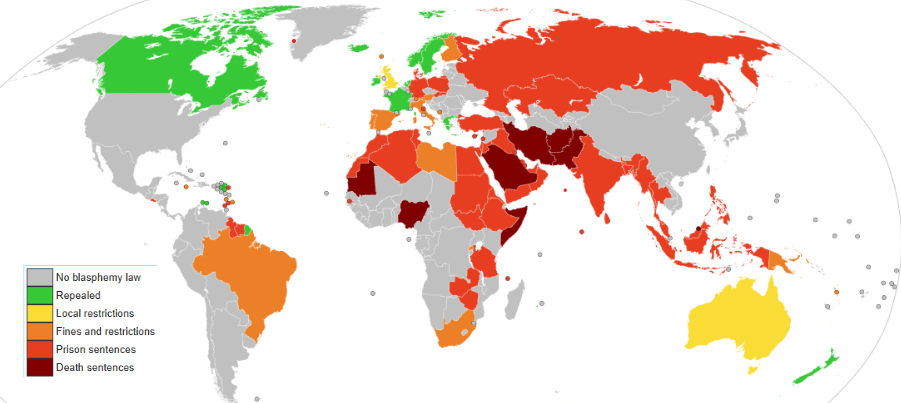Blasphemy Law Worldwide Map


Marcus Rodriguez
Historical Geography Expert
Marcus Rodriguez specializes in historical cartography and geographic data analysis. With a background in both history and geography, he brings unique...
Geographic Analysis
What This Map Shows
This visualization presents an overview of blasphemy laws across different countries, highlighting the legal frameworks and cultural attitudes surrounding such laws. It visually categorizes nations based on the existence and severity of blasphemy laws, providing a clear understanding of how these laws vary globally.
Blasphemy laws, which typically prohibit actions or speech deemed disrespectful to religious beliefs, can have profound implications on freedom of speech, human rights, and societal norms. The map serves as a critical tool for understanding the legal landscape regarding religious expression and the potential consequences individuals may face in various regions.
Deep Dive into Blasphemy Laws
Blasphemy laws have a long and contentious history, rooted in religious traditions and societal norms. These laws can range from mild prohibitions against offending religious sentiments to severe penalties, including imprisonment or even death. Interestingly, the enforcement of these laws often reflects deeper societal attitudes towards religion and secularism.
In countries like Pakistan, blasphemy laws are particularly stringent, with sections of the penal code imposing harsh penalties for acts deemed blasphemous. This has led to numerous high-profile cases, where individuals accused of blasphemy face mob violence or lengthy prison sentences. According to reports, over 1,500 people have been accused under these laws since their inception, showcasing the profound impact they have on personal freedoms.
Conversely, in countries like the United States, blasphemy laws have been declared unconstitutional, emphasizing a strong commitment to free speech as a fundamental right. This contrast highlights the ongoing debate between the protection of religious sentiments and the preservation of individual freedoms.
Globally, the approach to blasphemy laws varies significantly. Some nations have completely abolished such laws, while others retain them as a means to uphold religious values. For instance, countries in Europe, like Denmark and Norway, have moved towards decriminalization, reflecting a trend towards more liberal attitudes concerning freedom of expression.
However, the existence of blasphemy laws can indicate underlying tensions in society, especially in multicultural contexts where diverse beliefs coexist. In regions with significant religious diversity, such as Southeast Asia, the application of these laws can lead to conflict and societal unrest, raising questions about the balance between religious freedom and free speech.
Regional Analysis
Examining the map reveals distinct regional trends in the implementation of blasphemy laws. For example, in the Middle East and North Africa, many countries retain strict blasphemy laws. Nations like Egypt and Saudi Arabia have legal frameworks that punish blasphemy severely, reflecting the deep entrenchment of religious conservatism in these societies. In these regions, the laws often serve to bolster state authority and religious institutions, intertwining governance with religious doctrine.
In contrast, Western Europe tends to favor secularism, leading to a gradual decline of blasphemy laws. Countries such as Germany and the Netherlands have moved away from criminalizing blasphemy, instead opting for laws that protect freedom of expression. This shift highlights a growing recognition of the need to balance respect for religious beliefs with the fundamental right to free speech. Interestingly, the public discourse around blasphemy laws in these nations often focuses on the implications for artistic and political expression.
In South Asia, especially India and Bangladesh, the situation is more complex. While blasphemy laws exist, their application can be inconsistent, often influenced by political motives and social pressures. The recent rise of populist politics has seen an increase in accusations of blasphemy, raising concerns over the safety of minority communities and dissenters.
Significance and Impact
The significance of blasphemy laws extends beyond legalities; they are deeply intertwined with issues of human rights, freedom of expression, and the social fabric of nations. Countries that uphold stringent blasphemy laws often face international scrutiny regarding their commitment to human rights. For instance, organizations like Amnesty International and Human Rights Watch frequently highlight the plight of individuals persecuted under these laws, advocating for reform and greater protections for freedom of speech.
As society evolves, there is a noticeable trend towards questioning the validity and enforcement of blasphemy laws. With the rise of global communication and social media, individuals are more connected than ever, leading to increased calls for accountability and reform. Interestingly, many younger generations are advocating for a more secular approach, pushing back against traditional norms that restrict freedom of expression.
In conclusion, the map of blasphemy laws worldwide not only illustrates legal differences but also serves as a reflection of cultural values, societal tensions, and the ongoing struggle for human rights. As we move forward, understanding these dynamics will be crucial in fostering dialogue and promoting tolerance in an increasingly interconnected world.
Visualization Details
- Published
- September 4, 2025
- Views
- 104
Comments
Loading comments...